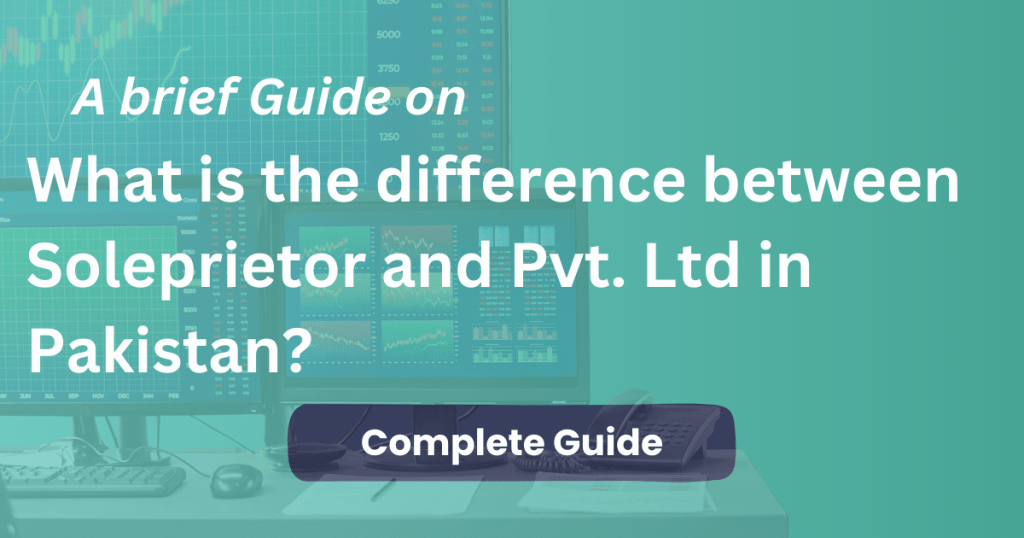In the labyrinth of business structures, two prominent forms stand out for entrepreneurs in Pakistan: Sole Proprietorship and Private Limited companies. Both offer distinct advantages and are governed by specific legal frameworks under the ambit of company laws and tax ordinances. Let’s delve into the nuances of each to understand which might suit your entrepreneurial aspirations best.

Sole Proprietorship:
A sole proprietorship is perhaps the most straightforward business structure, ideal for those looking to start small-scale ventures with minimal regulatory requirements. In Pakistan, the Companies Ordinance of 1984 governs the establishment and operation of sole proprietorships. Under this setup, an individual assumes full responsibility and control over the business, with the owner and the business being the same in the eyes of the law.
One of the significant attractions of a sole proprietorship is its simplicity. Registration requirements are minimal, often involving obtaining an NTN (National Tax Number) from the Federal Board of Revenue (FBR) and any relevant licenses or permits specific to the business domain. This simplicity extends to taxation as well, with the business’s profits being taxed as part of the owner’s income under the Income Tax Ordinance of 2001.
Key Features of Sole Proprietorship:
- Single Ownership: A sole proprietorship is owned and operated by a single individual, who is solely responsible for its management and decision-making.
- Simple Formation: Establishing a sole proprietorship in Pakistan involves minimal formalities and paperwork compared to other business structures, making it easy and cost-effective to start.
- Unlimited Liability: The owner of a sole proprietorship bears unlimited personal liability for the debts and obligations of the business. This means that personal assets could be at risk in case of business liabilities.
- Taxation: The business income of a sole proprietorship is typically taxed as part of the owner’s personal income. There is no separate tax entity for the business itself.
- Full Control: The owner retains full control over all aspects of the business, including decision-making, operations, and profits.
- No Separate Legal Entity: A sole proprietorship is not considered a separate legal entity from its owner. Consequently, the owner and the business are treated as one entity for legal and tax purposes.
- Ease of Dissolution: Dissolving a sole proprietorship is relatively straightforward, typically involving the cessation of business operations by the owner.
These features make sole proprietorships an attractive option for small-scale businesses and individual entrepreneurs in Pakistan, offering simplicity, control, and flexibility in business operations.
Boosting Women Entrepreneurs:
Women Enterprise – Clause 19 Part III 2nd Schedule
A ‘women enterprise’ is a start-up established on or after 1 July 2021 by women.
Women Enterprise means a sole proprietorship concern owned by a woman or an AOP all of whose members are women or a company whose 100% shareholding is held or owned by women:
A company whose 100% shareholding is held or owned by women shall be subject to tax at a reduced rate of 25% on its profit and gains derived from business chargeable to tax under the heading ‘income from business’.
However, the benefit of this clause will not be available to a business that is formed by the transfer, reconstitution, reconstruction, or splitting up of an existing business.
The benefit of a 25% reduction in tax liability is available where a 100% (under section 65F) tax credit is not available for any reason
Women’s Chambers of Commerce advocate for simplified tax regimes and awareness programs. The Federal Board of Revenue is responsive, establishing special desks and conducting awareness sessions to aid women entrepreneurs, recognizing the need to reduce tax compliance costs. Alongside tax measures, greater access to finance and advisory services is essential for supporting women entrepreneurs.
Reference: Encouraging women entrepreneurship – Business – DAWN.COM
Private Limited (Pvt. Ltd) Company:
On the other hand, a Private Limited company is a separate legal entity from its shareholders, governed by the Companies Act, 2017 in Pakistan. It’s a popular choice for small to medium-sized businesses due to its advantages in terms of liability protection and ease of ownership transfer.
- Liability of Shareholders: The liability is limited to the contributed amount.
- Minimum Capital Required: PKR 100,000 is the minimum capital required.
- Number of partners: Maximum 50 partners and a minimum of 2 partners are allowed.
Key Features of Pvt. Ltd Company:
- Limited Liability: One of the most significant advantages of a Pvt. Ltd company is limited liability. Shareholders’ liability is limited to the extent of their shareholding in the company.
- Taxation: Pvt. Ltd companies are taxed separately from their owners, and dividends distributed to shareholders are subject to withholding tax.
- Formation: Setting up a Pvt. Ltd company involves more formalities compared to an AOP. It requires registration with the Securities and Exchange Commission of Pakistan (SECP) and adherence to various regulatory requirements.
- Ownership Transfer: Shares of a Pvt. Ltd company can be easily transferred, allowing for flexibility in ownership.
Pvt. Ltd companies in Pakistan:
List of 14 Private Companies in Pakistan (mergr.com)
Differences in Company Law and Tax Laws:
- Company Law: AOPs are governed by the provisions of the Income Tax Ordinance, 2001, while Pvt. Ltd companies fall under the Companies Act, 2017.
- Taxation: AOPs are taxed differently as compared to Pvt. Ltd companies. In AOPs, taxation is based on the individual income of the members, whereas Pvt. Ltd companies are taxed separately.
Which One to Choose?
Deciding between a sole proprietorship and a Private Limited company depends on factors such as business scale, long-term goals, risk tolerance, and regulatory considerations. Sole proprietorships offer simplicity and autonomy, while Private Limited companies provide limited liability protection and scalability.
Entrepreneurs must assess these factors carefully and seek professional advice for an informed decision. Whether prioritizing agility or security, understanding company laws and tax ordinances is crucial for sustainable growth.

In conclusion, both sole proprietorships and Private Limited companies are integral to Pakistan’s entrepreneurial landscape, each offering unique pathways for business growth. Appreciating these nuances empowers entrepreneurs to navigate the complexities of the business world effectively.
